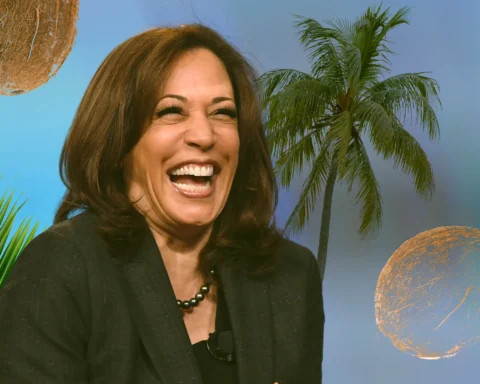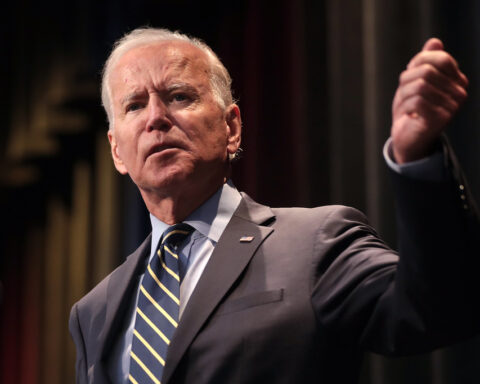Just days after signing the $1.9tn coronavirus relief package into law, Joe Biden was on the road selling the benefits of the bill to the American people – and also to his own party’s political prospects.
The president kicked off his “Help is Here” tour last Tuesday, visiting a Black-owned flooring business in Chester, Pennsylvania. “We’re in a position where it’s going to bring immediate relief – $1,400 – to 85% of the American public,” Biden said as he toured Smith Flooring. “And I think you should be aware: more help is on the way, for real.”
Democrats have been eager to trumpet the message that Biden has followed through on his campaign promise to deliver another round of stimulus checks and an extension of federal unemployment benefits to Americans who have financially struggled because of the coronavirus pandemic.
But the passage of the relief bill may also be the Democratic party’s best chance of keeping control of both chambers of Congress after next year’s midterm elections. Democrats are hoping that the aid it brings can help them avoid the historical trend of the president’s party losing congressional seats in the midterms following his election.
There is little room for error too, given Democrats’ narrow majorities in both chambers of Congress. Republicans need to flip just five seats to take control of the House, and a loss of a single Senate seat would cost Democrats their majority in the upper chamber. Such losses would seriously hobble Biden’s ability to enact his agenda.
With those high stakes in mind, the president and Vice-President Kamala Harris have been traveling across the country to advertise the relief bill in swing states that will hold key Senate races next year.
Biden told House Democrats earlier this month that he was determined to learn from 2009, when Barack Obama was hesitant to take a “victory lap” after the passage of the stimulus bill.
“We didn’t adequately explain what we had done,” Biden told lawmakers. “And we paid a price for it, ironically, for that humility.”
Democratic groups are helping with Biden’s victory tour, flooding the airwaves to remind voters in battleground states where those $1,400 direct payments came from. American Bridge 21st Century, a progressive political action committee, has announced a six-figure ad buy focusing on the impact of the relief package. The first ad, which featured a special education teacher talking about how the legislation would help schools reopen, started airing in Pennsylvania as Biden visited the state on Tuesday.
“This is a law that is going to help people’s lives across the board, and something that is this holistically comprehensive on the policy side is also going to be holistically popular for the midterms,” said Jessica Floyd, the president of American Bridge. Echoing many Democratic lawmakers and strategists in recent weeks, Floyd made a point to cite polling showing the relief bill enjoyed the support of a broad majority of Americans.
But Republicans, who unanimously voted against the relief bill in Congress, are not sitting on the sidelines as Democrats make their marketing pitch. Republican party leaders have been busy attacking the legislation as a liberal “wishlist” that does nothing to confront the crises facing the nation.
“Americans deserve targeted legislation that will accelerate vaccine distribution, get Americans back to work, and safely reopen our schools – not hyperpartisan and wasteful pork spending,” Ronna McDaniel, the chairwoman of the Republican National Committee, said in a statement after the passage of the bill.
The National Republican Senatorial Committee has already launched its own digital ads against two vulnerable Democratic incumbents, Mark Kelly of Arizona and Raphael Warnock of Georgia, accusing them of “bailing out” New York and California by approving the state aid in the relief package.
“Packed in the bill are provisions that will really hurt vulnerable senators in tough states,” a Republican operative focused on Senate races said. The operative predicted that Republicans’ criticism of “bailout” money to Democratic-controlled states and stimulus payments to undocumented immigrants would linger longer in voters’ memories than the $1,400 checks they received.
There is still time for both parties to shape how Americans view the relief package. Despite the positive polling about the bill, a recent survey from the progressive firm Navigator Research showed a majority of voters say they know little to nothing about the legislation.
So the challenge for Democrats and Republicans will be to both convince voters of the merit – or lack thereof – of the relief bill and then keep that issue at the forefront of voters’ minds as they start to consider which candidates to support next November.
In that sense, these competing messaging campaigns from the two parties represent the start of a months-long competition to define the beginning of Biden’s presidency in the court of public opinion. The winner of that competition will probably walk away with control of Congress.
“Part of our job is not to let people forget that Democrats put together a bill that is hugely popular now,” Floyd said. “Our job is to keep it popular and also point out for the coming months that every single Republican in Congress voted against it. I think keeping both of those facts top of mind starts today.”






